
My personal feeling is that ranking a director’s movies is a bit like debating the best meal of the day. Sometimes you want some eggs, sometimes you want cake; it kind of depends on what you’re in the mood for.
That being said, we’re talking movies, on the internet. The internet was built to host pointless debates and movies were meant to inspire them. If we wanted definitive answers at the end we could just watch sports. People say choosing your favorite of a beloved director’s films is like choosing a favorite child. I say that’s true, and also that deep down every parent has a favorite child. We all have our personal truths; to pretend otherwise would be a lie. In that spirit, these are my truths. Disavow me as you see fit (please don’t. I want your clicks and your respect).
A Note On Methodology
One question you have to answer when ranking Christopher Nolan movies is, are we talking about the films when they were released, or now? Christopher Nolan is one of our most influential directors, usually for better but occasionally for worse, and basically any technique he pioneered or used conspicuously since The Dark Knight has been mimicked by worse filmmakers with diminishing returns. Which has a way of cheapening the original slightly in hindsight, mostly through no fault of the original. Remember how ubiquitous the “BRAAAAAHM” sound effect was, post Inception? Remember bad guys getting caught on purpose after The Dark Knight?
I don’t have a time machine so I’ll be judging these movies on 2020 rules. It’s more interesting that way. Some of the movies I loved initially seem less interesting now, and vice versa. Aside from that, these movies’ evolution over time is also a product of the way Christopher Nolan approaches movies. Inasmuch as he likes to project “bookish, cerebral Englishman,” he’s also a showman (and I suspect looking like an intellectual is part of that show). He made his bones on flashy technique (becoming a hot commodity after Memento) and that kind of flashy storytelling is part of his identity. It’s hard to watch The Prestige and not see a bit of Nolan in Hugh Jackman’s character — meticulous, obsessive, intelligent, but also the guy who likes to be up on stage taking a bow at the end of the show.
“Technically innovative” and “gimmicky” are always two sides of the same coin, the former always bleeding into the latter depending on the charitability of the beholder. As such, virtually all of his movies have some choices I find brilliant and others I find slightly annoying. But his willingness to take that chance is part of the reason his movies are still must-see releases even after 10 or 11 of them. I like when he takes big swings. In hindsight I find myself appreciating the boldest moves even if they didn’t entirely payoff. In any case, if you find yourself disagreeing with me a lot here you’re probably just reading it wrong.
10. Following (1998)
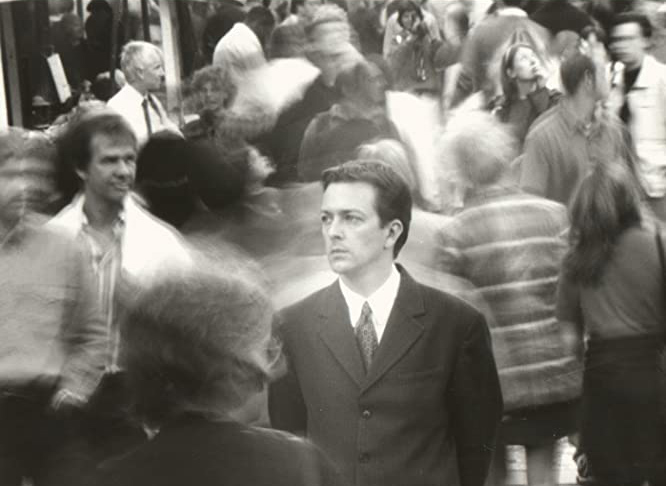
I debated even including Following in this list, considering Nolan was still an unknown when it was released (and after as well). Costing just $6,000 to make, earning a little more than $48,000 at the box office, and clocking in at a barely-feature eligible but very nice 69 minutes, Following seems more resume builder than stand-alone Nolan film, his self-financed cover letter to studios that might one day give him money to make a feature. Please, Mr. Studio Head, consider the twists!
Do you need to watch an underexposed, black and white, microbudget indie from the late ’90s to understand the Nolan canon? Probably not, and it explains why I hadn’t watched it until now. Having watched it (I’m very professional), it’s very much of a piece with other indie movies from the ’90s, when budding auteurs like Quentin Tarantino and Darren Aronofsky and Kevin Smith et al made cheapo black and white movies hoping to become The Next Big Thing. Now aspiring directors get five A-list actors for their debut, premiere it at Sundance, and like 20 journalists see it before it disappears forever.
Anyhoo, I was pleasantly surprised in Following‘s early going, which depicts a scruffy Londoner who follows people around for a hobby. He gets caught in the act by one of his subjects, who brings him into the world of petty burglary. There’s a Fight Club quality to Following, this portrait of young men living on the margins, seeking a kind of spiritual fulfillment the modern world has denied them, and the mentor/protege relationship between the two. Then the whole thing sort of fizzles into a double-cross plot with twist after twist. This is one of Nolan’s more unfortunate tics — his depictions of these odd little communities always seem (to me) better and more compelling on their own without the tit-for-tat constant double-crosses that Nolan always seems to thin he needs in order to maintain our attention.
9. The Dark Knight Rises (2012)
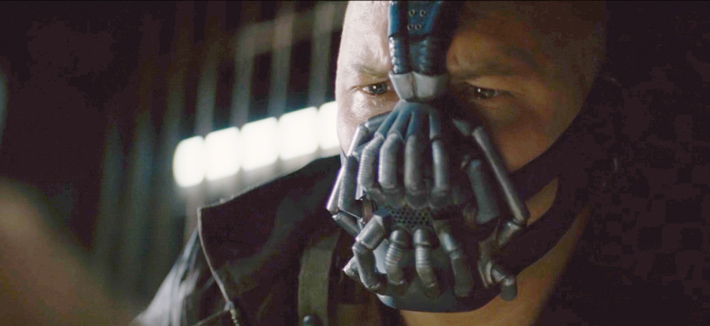
I think I can say that Christopher Nolan is simultaneously a great superhero director and that superheroes are Christopher Nolan’s least interesting subjects. The Dark Knight Rises wasn’t all bad, obviously, it had wistful Michael Caine, Tom Hardy’s Bane taking over a football stadium, and “that would be very painful… for you.”
But it is a movie where Nolan’s slightly annoying tics seem to catch up to his good ones. It’s a movie that makes me kind of hate Hans Zimmer. Or at the very least wish he came with volume control. Nolan’s tendency to value a “naturalistic” sound mix over an intelligible one and his love of a good score made The Dark Knight Rises feel like a music video at times, with an antagonist who mumbled worse than a xanny rapper (which is at least as much a Tom Hardy trait as it is a Christopher Nolan one) competing for aural space with constant sound effects and a bombastic score. Don’t tell me it’s more “natural” or “realistic” that way, this is still a Batman movie. Give me that goofy dialogue. I want to live deliciously, not naturalistically.
The Dark Knight Rises‘ Catwoman subplot is also notably forgettable compared to Michael Keaton/Michelle Pfeiffer in Batman Returns (admittedly I’m the guy who loves that weirdo Hot Topic goth fever dream, it’s pretty hard to beat). And it featured lots of nameless extras attacking each other Braveheart-style even when they have guns, which to me is just irredeemably dumb. Sorry, I can’t do anonymous henchman who inexplicably suicide themselves anymore.
I tend to think Christopher Nolan was just getting a little bored of growly Batman by this point (or maybe I’m just projecting) and with the demands of making a bookend, and it shows in some of the cut corners. It’s always a little more fun to just go where the characters take you than having to write them into a specific endpoint.
8. The Prestige (2006)
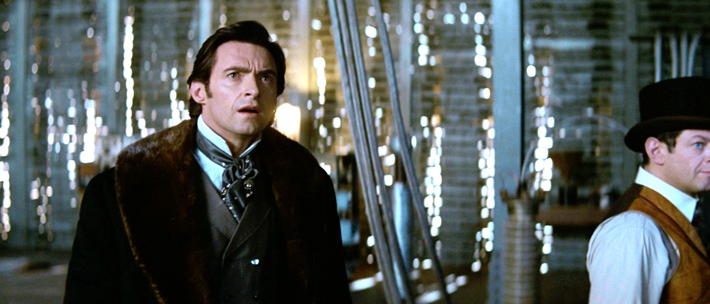
On paper, it’s hard to beat dueling Victorian-era magicians, David Bowie as Nikola Tesla, and doppelganger deus ex machinas. Andy Serkis even got to use his real face instead of jumping around in a spandex suit pretending to be a monkey. Nolan went waaay goofy in this adaptation of Christopher Priest’s novel and you have to love him for it. “The Prestige!” is also up there with “The Aristocrats!” in terms of titles that sound good to yell during orgasm.
Yet The Prestige is also the height of Christopher Nolan seeming to value subterfuge and shock twists over compelling character development, seeming to worry more about surprising the audience than making them care. The Prestige‘s whole story rests on a relentless (and eventually exhausting) feud between two magicians, American Robert Angier (Hugh Jackman) and Cockney Alfred Borden (Christian Bale), constantly determined to outdo each other for the mantle of “World’s Greatest Magician” (see parallels to Christopher Nolan and his co-writer brother Jonathan!). They are helped in this quest by their respective “ingenieurs” (aka engineers, an entire concept I’d love to believe Christopher Nolan just invented even though I know it probably came from the novel). One played by Michael Caine, the other some guy in obvious make up.
On the one hand, The Prestige seems to be a window into Christopher Nolan’s soul. It’s easy to believe he sees himself in Jackman’s protagonist, the showman who wants more than anything to give audiences grand illusions that allow them to believe in magic for a few seconds, the man who puts the ghost back in the machine.
That being said, I feel like there’s a limit to how many times one can use fake mustaches and doppelgangers as a dead-serious plot device. The two magicians double-cross each other so much that you end up wishing they could just be friends. Meanwhile, the expectation that we’ll be hanging off the edge of our seats and that we’ll be worrying about who will double-cross who! the whole time sort of cuts against all the goofy fun we could’ve been having with The Prestige. The film’s end twist (go look it up, I don’t want to get yelled at for spoiling a 14-year-old movie) is somehow unbelievable, unsurprising, and unsatisfying all at the same time. Oh? So it was exactly what Michael Caine said all along? Imagine that. The sheer silliness of it would be more fun if the accompanying monologue wasn’t so utterly self-serious. (Nolan movie rule: pay attention to whatever Michael Caine says.)
Unpopular opinion: of the two movies about dueling Victorian-era magicians released in 2006, The Prestige was inferior to The Illusionist. What was happening in 2006 that we ended up with two dueling magician movies?
7. The Dark Knight (2008)
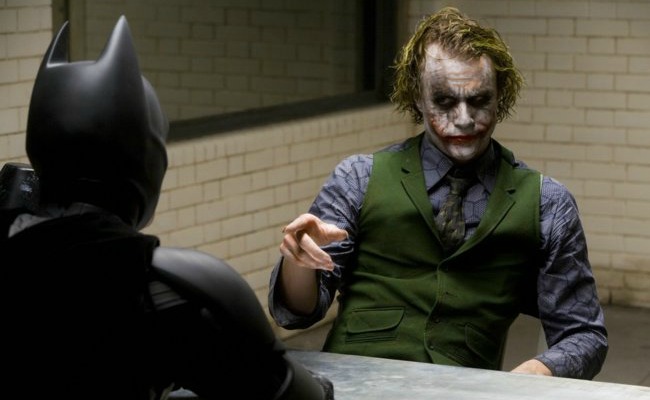
I’m not putting The Dark Knight this low as a contrarian take but I have to admit that the sheer number of people who treat it as sacrosanct and get pissed when you don’t agree that it’s the greatest superhero movie ever made make me like it less and less. It’s one of those movies that had me on the edge of my seat the entire time I was watching it but that I don’t feel like I especially need to see again.
Pros: The Dark Knight was the movie where Christopher Nolan came into his own directing action sequences. Early on he shot largely in the shaky-cam/quick-cut style that was popular at the time. On The Dark Knight he had a big budget to play with and used it brilliantly in masterful sequences like the whole bank robbery scene at the beginning. Also, Aaron Eckhardt was brilliant casting and I don’t know that I need to say more than has already been said about Heath Ledger.
Cons: Heath Ledger is brilliant as the Joker, but his performance masks the thinness of this character. The Dark Knight cuts a lot of narrative corners to make The Joker look cool. He kills a mob boss and that boss’s men are all instantly 100% loyal to the clown man? Is that how that works in the underworld? The Dark Knight’s universe rests on a foundation of mindless automaton criminals. Partly the years of other directors copying the “pure sociopathic chaos agent” antagonist and “bad guy gets caught on purpose” have cheapened The Dark Knight‘s impact in hindsight, but partly it’s also a movie that doesn’t work nearly as well when you have time to think about any one thing. To Nolan’s credit, he never gives you that time. I think Dark Knight can be a great movie without being an especially rewatchable one.
6. Batman Begins (2005)
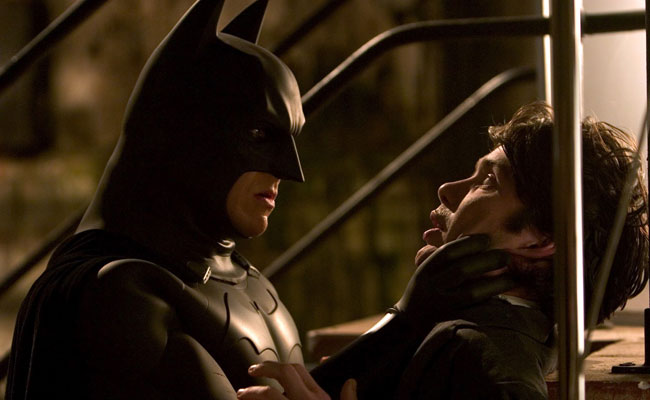
It’s a shame that Batman Begins has so many poorly shot shaky-cam action sequences (a time when Nolan and many others cobbled together fist fights from a thousand split-second blurs of feet, fists, lapels, chandeliers…) because almost everything else about Batman Begins is so great. I prefer the narrative grounding of Liam Neeson as evil mentor and Cillian Murphy/Tom Wilkinson as bad guy heavies to the flash of Ledger’s Joker. That Cillian Murphy’s Scarecrow is a bad guy whose MO is sneaking people drugs and then f*cking with them while they’re high? Genius. This guy is a professional mellow harsher, man! My love for Batman Begins was sealed when that first psychedelic worm crawled out of the eyehole in Scarecrow’s burlap face sack.
5. Dunkirk (2017)
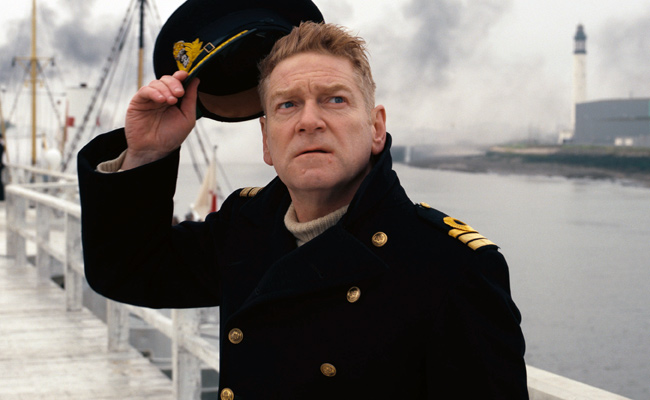
I love Dunkirk. It’s everything 1917 wanted to be. It also marked a clear inflection point in Nolan’s identity (Inflection! That’s the I movie he should’ve directed after Inception, Interstellar, and Insomnia!). Early in his career, from Memento through Inception (and Following, for the 40-50 people who’d seen it), Nolan’s calling card was mindf*cks. He was, for all intents and purposes, the mindf*ck guy, the director whose movies would keep tricking you right up until the end credits. Luckily, just as the audience’s interest in being endlessly mindf*cked was beginning to wane, we discovered Christopher Nolan had become the Large Format Majesty guy right under our noses, so gradually that it had become his brand before we even thought to notice. Dunkirk is the movie that cemented that incarnation of the Nolan brand.
Dunkirk is one of the few movies you could call “a pure cinematic experience” and not sound insufferable. It’s the kind of film that works best, and maybe only, on a giant screen in a big room full of people. If we’re splitting hairs, the title cards (“one week,” “one day,” “one hour”) and the intersecting timelines feel more like vestigial elements of Nolan’s older shtick, his belief that he needs to trick audiences to make us care. But they don’t especially detract even if they’re not especially useful.
It also feels a little like Nolan deliberately muffled Tom Hardy’s dialogue in Dunkirk as a f*ck you to everyone who complained about not being able to understand him in The Dark Knight Rises. I don’t like it, but I respect it. Christopher Nolan and Tom Hardy is the kind of team-up that’s even more mumbly than its individual parts.
4. Insomnia (2002)
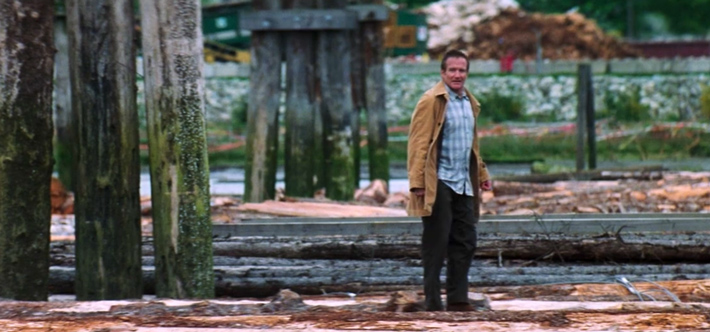
I sweated over whether to put Insomnia above or below Inception and Memento, because when I was trying to find a Nolan movie to rewatch, Insomnia is the movie I found myself most wanting to revisit. It’s the most obvious outlier in the Nolan canon. Where Nolan tends to make his bones on flashy concepts, Insomnia was, essentially, a police procedural, one of the oldest stories in the book and the subject matter of roughly 85% of our television shows. It’s also Nolan’s only remake (of a 1997 Norwegian film by Erik Skjoldbjærg).
Having rewatched it this past week, Insomnia not only holds up, I think it’s gotten better with age. Free of the usual requirement to wrestle a wild concept into believability, Nolan puts all his energy into Insomnia‘s subtler flourishes. Even aside from that, Insomnia is a textbook example of why setting matters. Nothing annoys me more than films that deliberately anonymize their setting, that take place in “Anytown, USA” as if that’s going to make us care more (specificity is always better!). The simple fact of where the story takes place creates so many narrative possibilities, and Insomnia is a perfect example. Removing setting as a story element for a screenwriter is like cutting off your own arm.
In the Norwegian version, a big city investigator played by Stellan Skarsgard (one of our finest Skarsgards), travels to a town above the Arctic Circle to investigate a murder. He’s also recently been caught having sex with one of his witnesses (a very European plot point). Nolan’s American version sees Al Pacino playing a famous LAPD homicide detective (I like to imagine it’s the same guy he played in Heat, only severely sleep-deprived) sent to Alaska, where he partners with a fresh-faced townie fangirl played by Hillary Swank — a character who will, naturally, prove to have more smarts and courage than anyone. When he accidentally shoots his partner during a chase we’re left to wonder if his inability to sleep is a result of the never-setting sun or his own guilt.
I remembered the unforgettable chase sequence at the log factory which is every bit as good as I remembered, but there were quieter moments I’d forgotten that stood up just as well. Robin Williams’ self-serving rationalization for why him killing that girl was just an unfortunate mistake, immediately punctured by Al Pacino’s “I don’t give a f*ck” soliloquy on the topic of motive. But in an era where we’ve (far too belatedly) begun handwringing about the ubiquity of “copaganda,” Insomniac stands out as a story that uses cops not as a cheap shortcuts to heroism but as a lens into humanity. It’s what a good story should do, regardless of subject or setting. This all culminates in Insomnia‘s pitch-perfect ending, Pacino telling Swank not to cut corners. It’s maybe Nolan’s best ending.
3. Memento (2000)
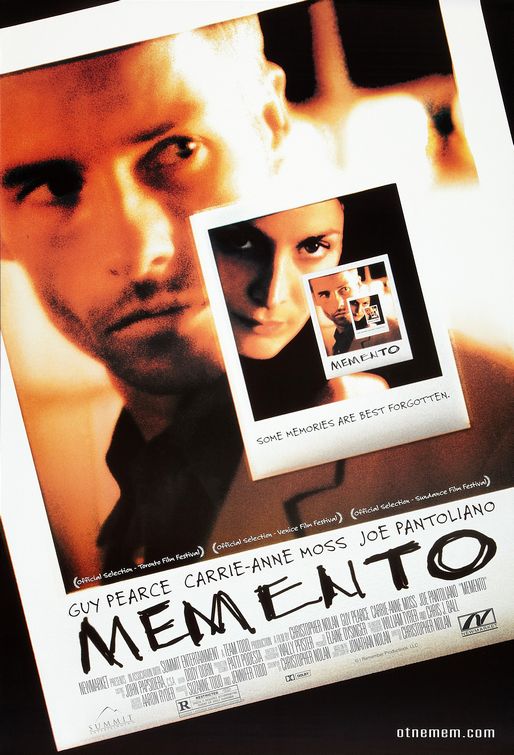
Memento stands out as the reverse of Insomnia, an acknowledged classic and a landmark in the Nolan canon even if I don’t feel compelled to rewatch it. Memento was Christopher Nolan’s break out hit, his calling card, the movie that established him as “ground-breaking director” right out of the gate. Memento is not only a break-out film for Nolan but maybe the seminal break-out film of all time. Arguably, the star of the film is the storytelling technique itself. How many films can you say that about?
Is Memento gimmicky? Absolutely, but it’s a good gimmick, and its success explains why gimmicks exist. When no one knows who you are, One Big Hook helps them remember. After The Dark Knight movies and Inception, Christopher Nolan got a reputation for seriousness, and general lack of a sense of humor. But if you go back and watch Memento, it has a lot of moments that are, at the very least, wry. You don’t cast Joey Pants if you aren’t aware of the humorous potential.
2. Inception (2010)
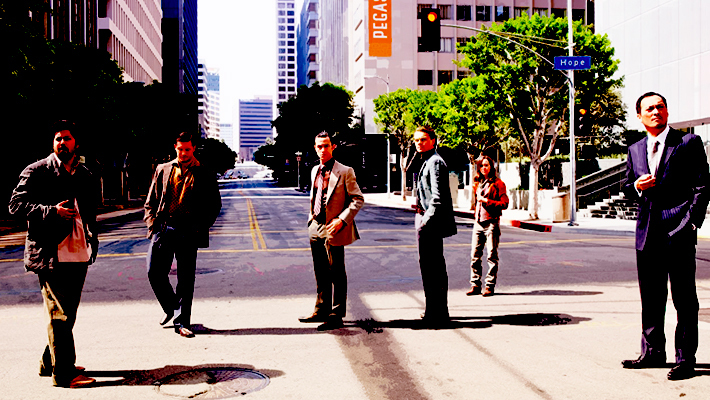
In terms of cultural impact, Inception is inarguable. BRAAAAHM sounds in trailers were ubiquitous for years afterwards. To this day I still hear people occasionally use “snow level” to describe something that’s evolved far beyond its initial intention. Snow levels, the spinning top, the squinting DiCaprio — Inception at this point is almost more meme than movie. Maybe that’s why I’m a little hesitant to rewatch it. I remember its greatness but we’ve probably squeezed all the juice from it at this point.
Inception is the ultimate expression of Nolan’s obsession with intersecting timelines and with expanding and contracting time — a storytelling element that’s present in almost all of his movies in some form or another. In Inception, the plot is almost entirely an excuse for them. Leonardo DiCaprio’s character also has the same name — Cobb — as the burglary mentor in Following. Cobb steals secrets from people’s dreams, and in that sense Inception is kind of a massive budget, fx-heavy version of Following, in which Cobb broke into people’s houses and stole, scattered, or moved people’s most personal possessions in order to gaslight them. If Dunkirk was the culmination of Nolan as Large Format Majesty Guy, Inception, with its kooky dreamscape scenes and rotating hallways, was probably the movie that gave him a hard shove in that direction. Also, bring back Joseph Gordon-Levitt.
1. Interstellar (2014)
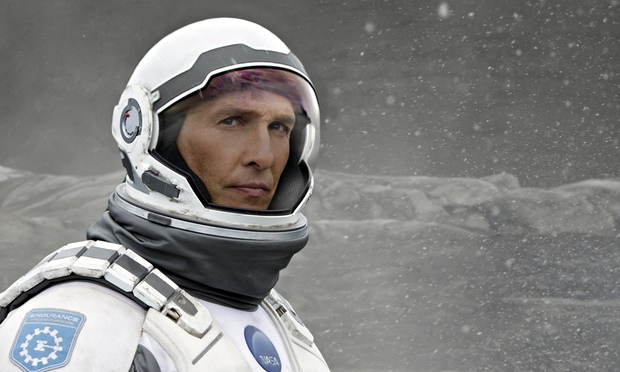
How to explain putting Interstellar at the top of the list even while conceding that it is messy and gets pretty silly at times? What I think happens with some of the best movies, and certainly the most enduring and rewatchable ones: intensity outpaces craftsmanship. And maybe that’s the way it should happen, that a storyteller gets so obsessed and in the weeds of their own ideas, that they crank the amp up to 11 and start wailing away, and what comes out might end up a little distorted or smoke out the whole garage, but in the end we remember the passion more than the sour notes or the property damage.
Hindsight only sharpens this effect. It seems plain that the initial reviews of Interstellar, even my own, didn’t give it enough credit. Was there too much expository dialogue, convoluted explanations, and laughably simplistic depictions of “love?” Sure, but six years later I can barely remember them. Interstellar‘s warts recede in contrast to the incredible worlds it conjured — the giant wave planet, the dust-choked dystopia, the ice purgatory. Nolan gave us more indelible images in Interstellar than we normally get in five or 10 movies. I wish I had a nickel for every time I or someone else compared a situation to “the first act of Interstellar.”
Apologies for quoting myself, but my closing paragraph in my original Interstellar review sums up most of what I love about Christopher Nolan movies and what I hope for every time a new one comes out.
I can understand if that’s not everyone’s cup of tea, or if it comes off bloated or pompous, but I think that’s just the way Christopher Nolan thinks. Dude’s wackadoodle, like a model airplane hobbyist reading Stephen Hawking on too much Adderall. He has his quirks and pet plots, but I’m always fascinated to hear his latest dispatch from the edge of sanity.
Here’s to hoping Tenet drove him just as nutty.
‘Tenet’ opens in theaters in the U.S. on September 3. Vince Mancini is on Twitter. You can access his archive of reviews here.
